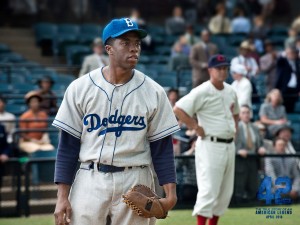Interview: Chadwick Boseman of “42”
Posted on April 11, 2013 at 8:00 am
Chadwick Boseman plays Jackie Robinson in “42,” this week’s release about the first black player in major league baseball in the modern era. Robinson’s extraordinary talent and grace under pressure was a powerful rebuttal to the racism that perpetuated segregation in sports and throughout American society.
Boseman spoke to a small group of journalists about preparing for the role and what it was like to work with Harrison Ford, who plays Branch Rickey, the man who offered him a job with the Brooklyn Dodgers. He did not originally intend to become an actor. He studied writing and directing. “As a director, it is important to understand the actor’s process. So, I took the acting courses at first for that, and then continued just because I caught the acting bug. For me, they go hand in hand, but it was a gradual process.”
He told us that one of the challenges of the film was that he didn’t just have to play baseball; he had to play it the way they played it in the 1950’s. “The uniforms changed! What’s different is the tools, the gear, the bats were a lot heavier. Not that you would know it from looking at the bats, but you can see it in the swings. There’s not many hitters that have Jackie Robinson’s swing now. It appears to be an unorthodox swing when we see it today. The gloves are different and using those old gloves changes the way you play. It’s fundamental to use both hands to get a ground ball if you can. You can see why that’s the case with those old gloves, because you can’t depend on catching anything with one hand. There’s no pocket. When they say ‘Make a pocket,’ you have to literally make that pocket. And shoes have come a long way. That was one of the hardest parts of the physical aspect of the movie, wearing old-style cleats, take after take. We went through four or five different sets of cleats and it took my feet a few months to heal. I would get up in the morning even three or four months after we were done and I would still feel like I had cleats on. It was like running on nails. But the game is pretty much the same game. And it has to be, that’s part of the mystique. Baseball is about tradition and the scorecard. You’re measuring players from the past against players now and if the game changed too much you can’t judge this person’s monumental home run season against another. It’s about the stats. The game is the game.”
He talked about how the athletes that have “reached that iconic status” have to be able to rise to that clutch moment. “He had to live his live in the clutch. It was never mundane because he was always getting judged on a different level. You have to cherish things in a different way when you know the clock is ticking, you are under pressure. It’s still human, it’s still detail, it’s still subtle like any other character, but the context that surrounds you has elevated.” He prepared for the role by playing a lot of baseball, with practice five days a week, plus conditioning five days a week. “That’s the physical part but there’s also the mental part of it, too. While you’re out there, failing and succeeding, you get a sense of the kind of pressure he really is under. You can’t play the role unless you know what it’s like to have the ball coming at you and it’s your assignment. Baseball is a game of assignments. From here to here, that’s your ball. It’s the other guy’s job to cover you. Or it’s your job to cover somebody else, or whatever it is. You have to play it to get how much pressure this person is under and how that emotionally affects him, how a mistake could get in his head, how much having his teammates look down on him affect him. I tried to figure out what he was thinking moment to moment because a lot of things he can’t say.” He watched footage of Robinson and the Ken Burns series on the history of baseball. He had to understand what the game was to the other players, too. “I tried to take in as much as I could.”
“He was an opinionated, assertive, outspoken person. That’s who he was. This person, who would come to blows — not prone to fight but doesn’t back down from anyone, not the person to run from a fight” was put into a position where he had to hold it inside. “He was not a passive person so you cannot play him passively. You find the most active non-verbal choices.”
After playing two athletes (he also appeared in the fact-based football drama, The Express), he says he’s ready to try something else. “Maybe a musician.”
He said it was “amazing to work with a legend” sharing scenes with Harrison Ford. “You get to see the shortcuts that they take. Like Jackie’s swing. He’s gotten to the point where he looks like he’s skipping stuff but he’s just short-circuiting it. You’re like, ‘How’d you do that?’ He has a feel for the set, so in tune with all the equipment and knowing how to facilitate the process and that’s a fun thing to watch. He doesn’t cherish this role any less than anything else he’s done.”
